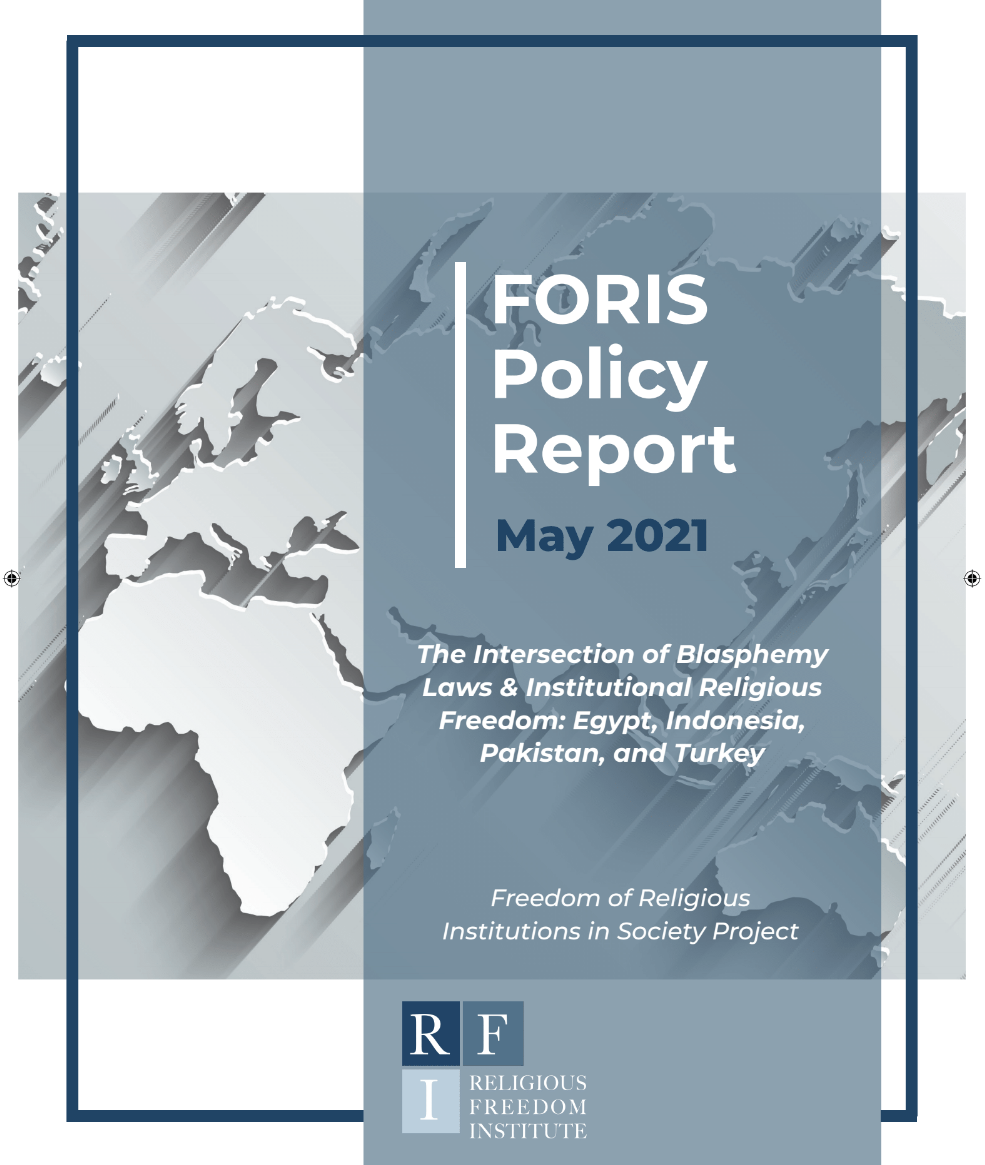In May of 2021, the Religious Freedom Institute released a policy report titled, “The Intersection of Blasphemy Laws & Institutional Religious Freedom: Egypt, Indonesia, Pakistan, and Turkey.” Produced under RFI’s Freedom of Religious Institutions in Society Project (FORIS), an initiative funded by the John Templeton Foundation, this report is the second in a series of three FORIS policy reports published this year. During the International Religious Freedom Summit held in Washington, D.C. in July 2021, RFI hosted a side event that featured a panel discussion on the report and the principles and societies it addressed.
Co-authored by Ahmet Kuru of San Diego State University, Robert Hefner of Boston University, and Jeremy Barker ,Director of RFI’s Middle East Action Team, the report makes the following observations and recommendations:
More than half of the 49 Muslim-majority countries in the world have laws punishing blasphemy—sacrilegious statements and acts against Islam. This rate is only around ten percent among non-Muslim countries. The blasphemy laws in Muslim-majority countries also tend to have more severe punishments than similar laws in other countries. There is also a trend in the Muslim world of passing new blasphemy laws.
Other studies have documented how blasphemy laws restrict individual freedom. This policy paper aims to contribute to this literature by examining how these laws limit institutional religious freedom. Institutional religious freedom is the presumptive freedom of a religious institution thus understood to define itself and its core convictions, govern itself by its core convictions, and express itself and its core convictions in society and public life to the extent and in the manner it wishes to do so.
Regarding this threefold freedom of religious institutions, blasphemy laws are deeply restrictive. This paper examines how blasphemy laws in four significant Muslim-majority countries—Egypt, Indonesia, Pakistan, and Turkey—can exact tremendous harm on certain religious communities by restricting their religious institutions.
This policy paper has two sets of policy recommendations:
-
To policymakers in these Muslim-majority countries:
In order to promote institutional religious freedom, secure equal citizenship, and maintain democratization, it is necessary to a) avoid passing new laws or amendments that punish blasphemy, b) suspend implementation of the existing laws, and, if possible, c) repeal the existing laws.
In many Muslim-majority countries, blasphemy laws already exist. The first recommendation, therefore, is not crucial for these countries. The third recommendation—repealing these laws—is crucial but may not be feasible. Hence, policymakers in these countries may prioritize the second recommendation—suspending their implementation. This may be a crucial and feasible option for policymakers of many Muslim-majority countries.
-
To policymakers in the United States:
The United States could encourage the governments of Egypt, Indonesia, Pakistan, and Turkey to a) avoid passing new laws or amendments that punish blasphemy, b) minimize the implementation of existing blasphemy laws, and c) repeal those existing laws, to the extent practicable.
In general, collaboration between U.S. government agencies and international organizations, such as the United Nations, is needed in order to promote an international commitment to institutional religious freedom as a universal value and to uphold a global understanding that blasphemy laws contravene this universal value.
Download and read the full report: The Intersection of Blasphemy Laws & Institutional Religious Freedom: Egypt, Indonesia and Turkey
Other FORIS policy reports:
-
Bauman, Chad, Robert Hefner, Timur Kuran, and Thomas Berg. “America’s International Religious Freedom Policy Must Account for Competing Local Definitions of Religion and the Common Good.”
THE RFI BLOG

Does Southeast Asia Lead the World in Human Flourishing?

RFI Leads Training Session on Religious Freedom Law and Policy for U.S. Army War College

Oral Argument in Charter School Case Highlights Unconstitutional Motives Behind OK Attorney General’s Establishment Clause Claim

Largest Longitudinal Study of Human Flourishing Ever Shows Religion’s Importance

Keys To Human Flourishing: Faith And Relationships Outweigh Wealth
CORNERSTONE FORUM

Reaffirming Religious Freedom: Bridging U.S. Advocacy and Iraq’s Constitutional Framework

Political Polarization, Same-Sex Marriage and Religious Liberty

Bridging the Gap Between International Efforts and Local Realities: Advancing Religious Freedom in the MENA Region

Challenges to Religious Freedom in Iraq and the Critical Need for Action


